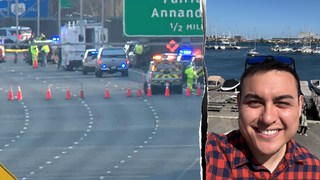White House says they are helping curb crime as nationwide crime wave continues
Lt. Randy Sutton says he has been impressed with the 'rhetoric' coming out of the White House, but 'hasn't seen much as far as action goes'
A 64-year-old man allegedly shot and killed a woman at a tennis club in Wilmington, North Carolina, this week before turning the gun on himself, according to police.
Police were called to Holly Tree Racquet Club around 5:30 p.m. ET on Tuesday on reports of a shooting.
The female victim was suffering from a gunshot wound and was pronounced dead at the scene after a Wilmington Police Department officer attempted life-saving aid.

The Holly Tree Racquet Club has 10 tennis courts and a pool in Wilmington, North Carolina. (Apple Maps)
The suspect, 64-year-old Dimitre Dimitrov, was transported to a local hospital for a self-inflicted gunshot wound but was later pronounced dead.
The Holly Tree Racquet Club frequently hosts clinics for children on its 10 tennis courts, which are located just a few miles from the beach.
The Wilmington Police Department said no one else was injured.
"No children were physically injured during this shooting. This is an isolated incident and is domestic in nature," the police department said this week. "Our thoughts and prayers go out to the victim and her family."
Dimitrov and the victim were going through a divorce at the time with both of them lodging physical and verbal abuse allegations against each other in court filings, WECT reports.
They were also in a custody battle for their 12-year-old son after separating in September, according to the local news outlet.
"The tragic event that occurred last night at Holly Tree racquet club was the result of a domestic violence dispute between a husband and his wife. The husband shot his wife and then turned the gun on himself. The victims were not members of our tennis facility. Our thoughts and prayers are with the surviving family," the tennis club said in a statement to the local news outlet.
CLICK HERE TO GET THE FOX NEWS APP
Reports of domestic violence increased globally between 25% and 33% as governments put stay-at-home orders in place and limited travel, according to a study in the American Journal of Emergency Medicine.











































